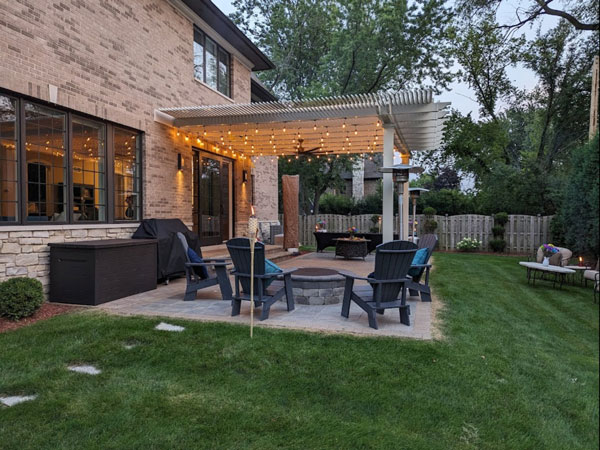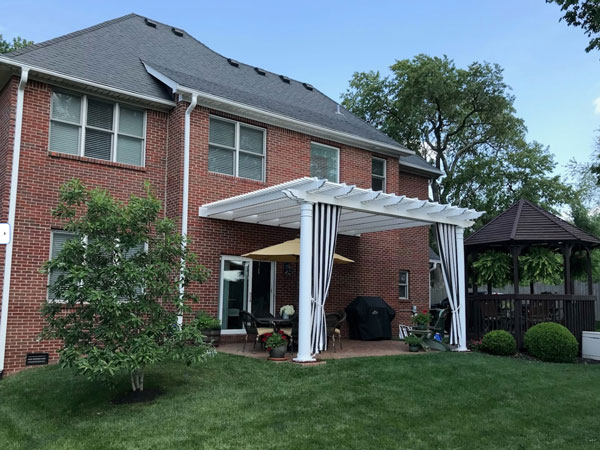Is 2024 the year you are ready to make some big improvements to your backyard space? Maybe you are looking for a full overhaul to make your own backyard retreat, or just looking to add some backyard shade and a few aesthetic upgrades. Either way, if a pergola is on that list, you may be wondering how much a pergola costs to install at your home.
Like just about everything these days, costs are all over the board. You can spend under $1,000 and get or build your own pergola, but the old adage of ‘you get what you pay for’ rings true here as well. We are not covering those budget pergolas as we believe if you are here really researching for a quality pergola, these temporary structures are not what you are after. We will focus on quality-built pergolas available for purchase. Pergolas that you can expect will last 10-20 years plus!

When contemplating the cost of a pergola, material selection plays a pivotal role. And each type of pergola comes with its unique characteristics and price points.
A classic and popular choice for a timeless look or to fit a more rustic look for your landscape, wood is a very popular choice. But it is also the material that has the shortest lifespan. All wood is of course not created equal, as different species of wood do fare better in the long term. Hardwood like cedar, redwood, or exotic hardwood species will give a longer lifespan than a simple treated pine. While you can buy wood pergola kits, it’s with wood that you often see very custom builds by experienced an carpenter. A simple wood kit can be less expensive while the highly custom designs will drive up the price.
Advantages of Wood: Wood is readily available and can be very solid in construction. A simple design and treated pine style wood pergolas will have lower upfront costs.
Disadvantages of Wood: The lifespan of wood is the biggest downfall. Wood is the most susceptible to damage from insects and weather resulting in rotting, splitting, and weakening of the structure over time. You also must consider the time and maintenance needed to care for a wood pergola. Sanding down and staining or painting on a regular basis is important to the longevity of wood. But many people aren’t excited about spending the time to do that task, neglecting their structure and getting fewer years out of it. Lastly, wood pergolas often have the least amount of shade unless you add a fabric canopy over the top or grow thick vines to filter the light.
Growing in popularity for both their modern look, and range of features, aluminum pergolas have exploded onto the market in the last few years. Aluminum is a lightweight but strong metal that is appealing. Many low-cost aluminum pergolas are available from big box stores or online. The key here is that most of these low-cost options are thin-walled lightweight aluminum with poor construction that tends to break easily and in a stiff breeze, can become a new lawn ornament for your neighbor.
Advantages of Aluminum: The look of aluminum is one of the biggest advantages. People moving away from a rustic or traditional design find the sleek designs of aluminum to be appealing. The lightweight nature of aluminum also contributes to easier installation which can reduce labor expenses. Many of the high-end aluminum pergolas on the market also come with a full range of automated features. While it drives up the cost, these features provide added comfort and extended use of your pergola.
Disadvantages of Aluminum: One of the biggest drawbacks of Aluminum is the lack of customizations available. Except in very high-end models, custom angles and shapes may not be possible. Heat transfer is also a concern for some as aluminum is likely to absorb more heat making the structure warmer to the touch and radiating more heat around and under the pergola as well. While aluminum is considered durable, the surface can be prone to scratches and denting, which would require professional services to fix. Assembly of aluminum pergolas, particularly those with extended features, will be more labor intensive.
Known for their versatility in design and low maintenance, fiberglass pergolas are another lightweight option you can turn to for your pergola designs. They are constructed using fiberglass-reinforced polymers. This composite material combines the strength of fiberglass with the versatility of polymers, resulting in a durable and low-maintenance structure.
Advantages of Fiberglass: Fiberglass is known for its resistance to decay, insects and environmental factors. That creates a longer lasting structure that can withstand a range of weather conditions like heat, UV rays, salt air and moisture. Unlike wood, fiberglass is considered a low maintenance material. Fiberglass is also very versatile in that it can be molded to many shapes and styles.
Disadvantages of Fiberglass: You often find the upfront cost of Fiberglass pergolas can be higher than that of similar low maintenance pergolas made from aluminum or vinyl. Fiberglass can also be more challenging to install. Proper installation often requires professional expertise to ensure structural integrity. Although fiberglass stands up to many environmental factors, one area that they struggle in is durability against strong winds. The lightweight material is often not as tough against high wind conditions as aluminum or re-enforced vinyl pergolas would be.
Vinyl pergolas are a cost effective, durable, versatile and very low maintenance pergola option. There are a variety of styles and shapes as well as being very adaptable in the field to be trimmed to a very precise fit for your space.
Advantages of Vinyl: Vinyl is easy to clean, occasional soap and water is all that is needed to keep your pergolas looking like new. Vinyl is impervious to damage from insects and environmental factors. Vinyl pergolas often have color throughout the material, which means they resist fading and maintain their original color over time. Vinyl is super lightweight making it easy to transport, move and build with. It’s also easy to trim down to fit your space perfectly.
Disadvantages of Vinyl: The biggest downfall with vinyl is the limited color options. Most vinyl pergolas only have shades of white or tans which may not fit in with all home and landscape designs. Those looking for a more natural wood appearance may find vinyl just doesn’t suit their needs.

Our cost comparison: to keep things as simple as possible, we looked at free standing structures roughly 14’ x 14’, with 6” posts at 10’ high in size. Your locality can affect material pricing as does the labor costs to install. Pergolas from big box stores, Amazon, etc. can start off at just a couple hundred dollars. Keep in mind that we have not included low budget, low quality pergolas in our pricing comparison below.
Wood pergolas will have a very diverse range depending on the type of wood used and the intricacies of the design. Expect material pricing in the $27-$100 per square foot range.
We are mainly looking at standard pergolas with fixed or manually rotating louvres. You can find the prices on the high end as you start to move into some automation. You will find materials in the $35 – $80 per square foot range. Aluminum pergolas can have amazing, automated features, but the price tag on these very high end, high functionality pergolas will jump significantly as well – think - $200-250/sq foot.
Material costs for a fiberglass pergola often range from $48-$75/sq ft. The higher end costs typically include larger post sizes and additional decorative features.
Vinyl pergolas can be very inexpensive, and those on the smaller budget spectrum typically do not include any kind of internal reinforcement. It’s highly advisable to avoid vinyl pergolas without internal support as they will not stand up against strong winds or storms. Pergolas reinforced with aluminum are the best option as they provide the strength and longevity of aluminum with the low maintenance and durability of the exterior vinyl. Aluminum reinforced pergolas can be found in the $44-$72/sq ft range.
Some pergolas brands and kits are DIY friendly. Before tackling the pergola build on your own, be sure you read the manufacturers instructions and understand the tools and knowledge you will need before you purchase. Other pergolas are going to require the skill, tools and knowledge of a licensed and experienced contractor. The additional labor can run you anywhere from $2,000 to $10,000 based on the complexity and materials of the pergola you are installing.
Conclusion
In the wide-ranging landscape of pergola costs in 2024, knowing what your needs are in terms of size, style, and features is key to getting a pergola the fits your landscape plan. By navigating the terrain of material choices, design complexities, and installation considerations, our mission is to empower you to make a choice that aligns with your vision and budget. Remember that investing in quality today ensures a timeless outdoor haven tomorrow.
Price out your custom pergola with our pergola builder. Want to shop for pergolas kits that are DIY friendly without sacrificing quality! Browse our site or contact our helpful customer support team to get started!
If you can’t find what you’re looking for please give us a quick call at 563-345-6745 or use our chat box in the bottom left corner of your screen!
What kind of pergola lasts the longest?
DIY Pergola Installation or Professional Installation, Which Is Right For You?
Best Outdoor Fan For A Pergola
Elevating Outdoor Elegance: Pergola Shade Structures in High-End Landscape Designs
2024 Pergola Pricing Unveiled: Pricing of Quality Pergolas For Your Home